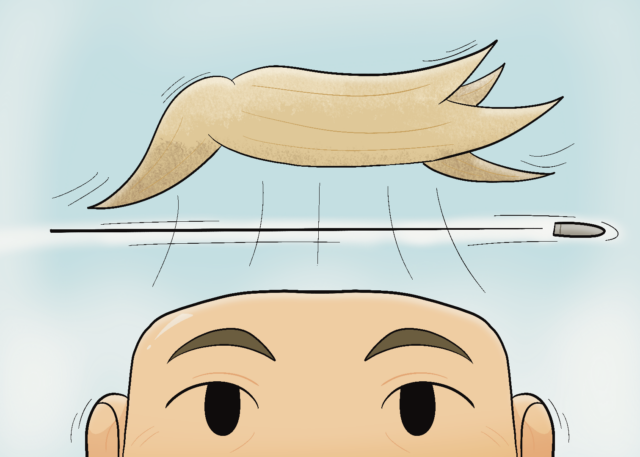By the Editorial Board
In 2022, 48,204 people died by firearms in the United States, according to the Johns Hopkins Bloomberg School of Public Health. 21 of those lives were taken at Robb Elementary School in Uvalde, only hours away from Waco. Just three weeks ago, in Georgia, four more students were killed at Apalachee High School.
And while victims of these random acts of gun violence are afforded a little more than “thoughts and prayers,” politically-motivated shootings and assassination attempts are given a higher profile in this country as those from across the aisle race to rightfully denounce them while simultaneously sending lukewarm messaging about school shootings.
Republican Vice Presidential nominee JD Vance lauded former President Donald Trump’s continuing to golf after a second shooting attempt as “courage under fire,” while he brushed off the shooting in Georgia as a sad, unfortunate “fact of life.”
Recently, Trump criticized the handling of his second would-be assassin, Ryan Routh, as a “slap on the wrist.” He even went so far as to blame the second attempt on Biden and Harris’ campaign language.
“He believed the rhetoric of Biden and Harris, and he acted on it,” Trump told Fox News Digital. “Their rhetoric is causing me to be shot at, when I am the one who is going to save the country, and they are the ones that are destroying the country — both from the inside and out.”
But, what has been his tepid response to school shootings?
After one that killed a sixth grader and injured others in Iowa in January, he told supporters to “get over it.” Also, he sent his “support and our deepest condolences” to families.
When a politician is endangered, it is an opportunity for unity and for the country to coalesce behind them to condemn the division that bred the shooting. Meanwhile, members of Congress twiddle their thumbs instead of doing anything to prevent a problem which is so sinfully staring this country in its face, gun control or mental health measures alike.
Truthfully, this country is not accustomed to acts of political violence. The assassination of President Abraham Lincoln has so far receded into our past that it has become part of American legend, not American life. Most people of voting age were not alive or old enough to remember the assassination of President John F. Kennedy in 1963. Many students at Baylor were not around when John Hinkley Jr. attempted to kill President Ronald Reagan.
But, there have been 417 school shootings since Columbine, and college-aged Americans have participated in active shooter drills for as long as we can remember. When 27 people were killed at Sandy Hook Elementary School, our classes made cards to send to the survivors. Those children were our age, those teachers like our own.
Many of our schools faced shooter threats, credible or not. And until the day we graduated, we annually drew curtains over the windows, turned the lights out, crammed together in a corner and awaited the principal’s voice on the intercom to call off practicing for our darkest day.
If we can be so unequivocal in our denouncement of politically-motivated gun violence on both sides of the spectrum, why does this country still struggle to take action to address the far more common loss of life in our public schools? The life of a politician is no more valuable, no easier to cherish, than the lives of innocent children.
Let us be clear: no gun violence has a place in this country. Political assassination attempts threaten to drag the United States into a nation of civil warfare, taking our already divided politics and throwing gasoline on the flames. If we don’t ditch this dark road, we will never be the same. But we cannot let ourselves be outraged only by political violence while becoming desensitized to the killings of our classmates, teachers and friends.
There is no hierarchy to victimhood, and gun violence — all gun violence — must meet an end.



